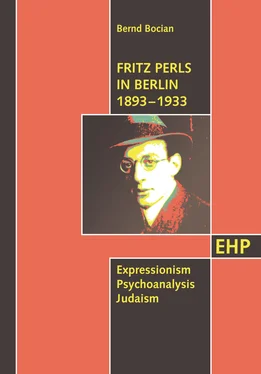Bernd Bocian - Fritz Perls in Berlin 1893 - 1933
Здесь есть возможность читать онлайн «Bernd Bocian - Fritz Perls in Berlin 1893 - 1933» — ознакомительный отрывок электронной книги совершенно бесплатно, а после прочтения отрывка купить полную версию. В некоторых случаях можно слушать аудио, скачать через торрент в формате fb2 и присутствует краткое содержание. Жанр: unrecognised, на английском языке. Описание произведения, (предисловие) а так же отзывы посетителей доступны на портале библиотеки ЛибКат.
- Название:Fritz Perls in Berlin 1893 - 1933
- Автор:
- Жанр:
- Год:неизвестен
- ISBN:нет данных
- Рейтинг книги:3 / 5. Голосов: 1
-
Избранное:Добавить в избранное
- Отзывы:
-
Ваша оценка:
- 60
- 1
- 2
- 3
- 4
- 5
Fritz Perls in Berlin 1893 - 1933: краткое содержание, описание и аннотация
Предлагаем к чтению аннотацию, описание, краткое содержание или предисловие (зависит от того, что написал сам автор книги «Fritz Perls in Berlin 1893 - 1933»). Если вы не нашли необходимую информацию о книге — напишите в комментариях, мы постараемся отыскать её.
Fritz Perls in Berlin 1893 - 1933 — читать онлайн ознакомительный отрывок
Ниже представлен текст книги, разбитый по страницам. Система сохранения места последней прочитанной страницы, позволяет с удобством читать онлайн бесплатно книгу «Fritz Perls in Berlin 1893 - 1933», без необходимости каждый раз заново искать на чём Вы остановились. Поставьте закладку, и сможете в любой момент перейти на страницу, на которой закончили чтение.
Интервал:
Закладка:
In his monograph on autobiographies that were written in the 1920s, Peter Sloterdijk cited diverse examples to point out the childhood memories of experiencing social conflicts, inconsistencies, and power structures that repeatedly emerge there. He speaks of »proto-political experiences,« describing them as the experiential foundation that is »necessary to construct a political identity if it is not to be imposed from without or assimilated through identification, but instead grows out of self-articulated politico-social experience« (Sloterdijk 1978, 140).
In this sense, I would definitely interpret Perls’s nonconformism, rebelliousness, and massive ego-assertion as an authentically »political« posture toward society, fed in part by the early experiences discussed here. Perls’s erratic-associatory biographical work contains the »little scenes that capture the atmospheric details of his childhood« (ibid., 142) that Sloterdijk analyzed and which at the same time reflect early sensory experiences of power relationships that were ultimately societal in nature. In the days when authoritarian families and authoritarian character prevailed, God, the Emperor, the state, the father, parents, or teachers formed the chain of those who ruled, whose word was incontestable law, and who were permitted to enforce such law through intimidation, punishment, and violence.
During his conflict-laden period of upheaval at school, he appears to have experienced at home that he was not loved for his own sake, but that love was contingent on his achievements, on something external. This is where the narcissistic injury and rebellion of a »lovable child« began, a child who fought against parental introjects and against being defined as »bad.« It was to become a life-long theme and, as a result, it re-emerges in Gestalt therapy: self-determination as opposed to heteronomy, or, that which is one’s own as opposed to that of the other. He vehemently opposed his parents’ criticism and accusations, the message they conveyed that »you are bad,« and the projection of their own disappointments and negative feelings for which they held him accountable. He resisted being made into the symptom carrier of his family’s problems. In addition to that, his parents had a bad relationship. There was a lot arguing and physical fighting, and the gravest insults were a daily occurrence. He never forgot that his father often called him »a piece of shit.« He experienced his parents’ reactions 23(and he added those of »society« and »spouses«) as existentially devastating: »I want to eliminate you. You should not be. Where you are, there should be nothing instead. (…) We educate you … until you become what We, We, We, want you to be« (Perls 1977, 260-261). Elsewhere, Perls cites an example that I suspect is at least mingled with his own experiences. There is a passage where he defined a traumatic neurosis as a defense structure which is used to ward off an »intrusion of society« (Perls 1973, 31). »The two year old child whose parents lock him in a dark closet overnight has been subjected to an almost insupportable strain. He has been reduced by their behavior to nothing – indeed, to less than nothing – to an object of manipulation with neither rights nor powers of his own. There is no »he« any more, there is only »they« and what »they« can do« (ibid., 31 f.).
The response to these experiences with his family was a risk-inclined rebellious »Me, Me, Me.« From here, a direct line can be drawn to the so-called Gestalt Prayer, which I would like to quote in this early context:
I do my thing, and you do your thing.
I am not in this world to live up to your expectations
And you are not in this world to live up to mine.
You are you and I am I,
And if by chance we find each other, it’s beautiful.
If not, it can’t be helped (Perls 1969a, 4).
This assertion of his ego served as self-defense, but it was accompanied by a search for a warming »we.« It also had a social or, more precisely, a culturally critical dimension. In this respect, Perls shared the same suffering as many in his generation. The self-assertive struggle against an overwhelming, distant father who barely (if at all) acknowledged his son became linked to the fight against the cold, materialistic Wilhelminian values which also stood for one’s own father. The struggle against the phoniness of the bourgeoisie with its double moral standard, and ultimately against the entire hierarchical social order, merged into a huge single theme that was reflected in literature as well. Franz Kafka’s »Letters to His Father« became famous; Hermann Hesse’s brief work on the virtue of self-will (Eigensinn) (Hesse 1988), and Georg Kaiser’s Expressionist drama »Vatermord« (parricide) were typical. Almost all bourgeois biographies from the period report such struggle and agony. Otto Rank’s emphasis on self-will in therapy – which was also reflected in his authority conflict with Freud – has a strong bearing on this topic, as does the radically anti-authoritarian anti-introjection theory of the anarchistic »psychoanalyst« Otto Gross, whose father periodically had him involuntarily committed to a mental institution. In all of these cases, the »I« opposes a »You« that is experienced as authoritarian; self against other. I will return to this topic in the chapter on the Weltanschauung of bohemian Berlin.
Perls has often been accused of having almost no interests beyond his own ego. In my opinion, this can be traced to a lack of detailed knowledge about his life experiences in Germany until 1933. Yet the biographical reality is that for many years he held out hope for a socialistic brotherhood, just like many of his peers and contemporaries. He actively championed this form of »We« until the utopia was brutally demolished by the Nazis. Due to his early experience of falling back on his own ego and his own resources, and due to favorable external support which his risk-inclination enabled him to recognize and utilize, he ultimately survived well and learned his lessons. When other »brothers« in hope and suffering found themselves in exile with shattered dreams and saw their efforts dashed to achieve a more just social order and a meaningful life based on their own standards and ideas, they responded by killing themselves. So it was with Ernst Toller and Walter Benjamin who, like Perls, were born in 1893.
3.3.1 »The Emperor has no Clothes.«
One factor that influenced Perls’s rebelliousness was certainly the early unmasking of that which was mysterious and impressive as a farce and mere semblance. He apparently lost respect for the mighty and their aura of power at an early age. The ritual ceremonies at the Jewish synagogue »did not produce any awe« (Perls 1977, 249) in him, and when his father deemed him worthy of acceptance into his Freemason Lodge at about age 18, Perls found the process ludicrous. Even his entry into his father’s »secret room« (ibid., 251) had proven a disappointment. And now something similar was happening. »I was curious to penetrate the veil of that mystery and ready to go through that ordeal. What a shame and disappointment!« (ibid., 250). Perhaps the disappointment also represented the de-idealization of his father once and for all, »with the broad blue ribbon across his chest, a long impressive beard, a powerful figure« (ibid.).
Just as in the fairy tale of »The Emperor’s New Clothes,« authority is »naked«; the child is not impressed and does not allow itself to be intimidated, hypnotized, or deceived. It takes a look and trusts its own senses. Perls identified with the message of this fairy tale by Hans Christian Andersen and put the following words into the mouth of the child who was to be dissuaded from what it saw: »How can I trust my senses? They love me not if I can’t see! I need their love more than the truth. It’s hard to swallow, but I take my lesson in adjustment« (ibid., 25). 24This was a lesson Perls refused to learn as a child, and he continued to refuse until the end of his days. Over the course of his life, he himself appeared »naked,« and he »undressed« others, which garnered him both rejection and fame. In a certain sense, he was disrespectful; he was interested in reality and not in appearances, and he exposed matters correspondingly. That was a help to those who were strong enough to find themselves, while others were injured and deeply hurt. In therapy, he often looked for what he called contact and genuine feelings. Then he was touched and would become soft and very close to the other person.
Читать дальшеИнтервал:
Закладка:
Похожие книги на «Fritz Perls in Berlin 1893 - 1933»
Представляем Вашему вниманию похожие книги на «Fritz Perls in Berlin 1893 - 1933» списком для выбора. Мы отобрали схожую по названию и смыслу литературу в надежде предоставить читателям больше вариантов отыскать новые, интересные, ещё непрочитанные произведения.
Обсуждение, отзывы о книге «Fritz Perls in Berlin 1893 - 1933» и просто собственные мнения читателей. Оставьте ваши комментарии, напишите, что Вы думаете о произведении, его смысле или главных героях. Укажите что конкретно понравилось, а что нет, и почему Вы так считаете.











